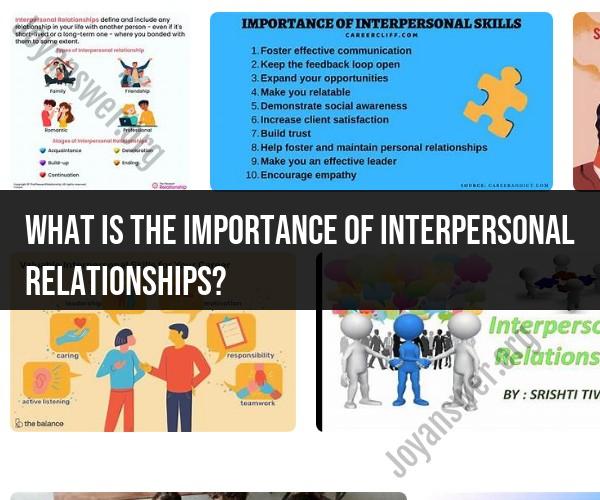What is the importance of interpersonal relationships?
Interpersonal relationships play a vital role in our lives, impacting our emotional, psychological, and even physical well-being. The significance of interpersonal relationships is profound and can be observed in various aspects of life. Here are some key reasons why these relationships are important:
Emotional Support: Interpersonal relationships, such as those with friends, family, and romantic partners, provide emotional support during challenging times. Having someone to talk to, lean on, and share your feelings with can help you cope with stress and adversity.
Mental Health: Healthy relationships contribute to positive mental health. Feeling connected and valued by others can reduce feelings of loneliness, anxiety, and depression. It can boost self-esteem and overall well-being.
Socialization: Relationships are a primary means of socialization. They help individuals learn about social norms, values, and acceptable behavior. Interacting with others teaches communication and conflict resolution skills.
Sense of Belonging: Interpersonal relationships create a sense of belonging and community. Feeling connected to a group or community is a fundamental human need and provides a sense of identity and purpose.
Stress Reduction: Positive relationships can act as a buffer against stress. Supportive friends and family can offer perspective, advice, and assistance during challenging times, helping to alleviate stress.
Physical Health: Research suggests that strong interpersonal relationships can lead to better physical health. This may be due to reduced stress and better health behaviors when individuals feel supported and cared for.
Personal Growth: Interpersonal relationships provide opportunities for personal growth and self-discovery. Through interactions with others, you can gain insight into your own thoughts, behaviors, and values.
Conflict Resolution: Healthy relationships teach conflict resolution skills. Learning how to navigate differences, negotiate, and resolve conflicts with others is essential for both personal and professional life.
Collaboration and Teamwork: In the workplace, positive interpersonal relationships are critical for collaboration and teamwork. When team members have strong working relationships, it often leads to greater productivity and innovation.
Networking: Professional relationships can open doors for career opportunities. Building a network of contacts and maintaining strong relationships with colleagues, mentors, and industry peers can lead to career advancement.
Personal Fulfillment: Many people find meaning and personal fulfillment through their relationships. Whether it's the joy of parenthood, the companionship of a romantic partner, or the bond with close friends, relationships contribute to a sense of fulfillment and happiness.
Longevity: Some studies have suggested a connection between strong social relationships and increased life expectancy. Being socially engaged and having a supportive network can contribute to a longer, healthier life.
Happiness: Strong interpersonal relationships are often linked to happiness and life satisfaction. Having a circle of friends, family, or loved ones who care for and support you is a significant source of joy.
In summary, interpersonal relationships are crucial for human well-being and personal development. They provide emotional support, contribute to mental and physical health, help individuals navigate social complexities, and offer a sense of belonging and happiness. Cultivating and nurturing positive relationships is an important aspect of a fulfilling and meaningful life.
Exploring the Significance of Interpersonal Relationships
Interpersonal relationships are the connections that we have with other people. They are essential to our well-being and happiness. Interpersonal relationships provide us with love, support, and companionship. They help us to learn and grow, and they give us a sense of belonging.
Interpersonal relationships can be romantic relationships, friendships, family relationships, or even relationships with people that we work with or interact with on a daily basis. All of these relationships can have a significant impact on our lives.
The Impact of Interpersonal Relationships on Mental Health
Interpersonal relationships have a major impact on our mental health. Strong interpersonal relationships can help to protect us from stress and anxiety. They can also help us to cope with difficult emotions and challenges.
Studies have shown that people with strong social support networks are less likely to experience depression and anxiety. They are also more likely to recover from mental health problems.
Building Strong Interpersonal Relationships in Personal Life
There are a number of things that you can do to build strong interpersonal relationships in your personal life:
- Be supportive and helpful. Offer to help your friends and family members when they need it. Be there for them emotionally as well.
- Be a good listener. When someone is talking to you, give them your full attention. Avoid interrupting and make eye contact. Let them know that you are hearing them by nodding your head and asking clarifying questions.
- Be respectful and honest. Treat your friends and family members with respect, even if you disagree with them. Be honest with them about your feelings and intentions.
- Be yourself. Don't try to be someone that you're not. People will be drawn to you if you are genuine and authentic.
The Role of Interpersonal Relationships in Professional Success
Interpersonal relationships also play an important role in professional success. Strong interpersonal relationships can help you to build trust with your colleagues and clients. They can also help you to get ahead in your career.
Studies have shown that people with strong social skills are more likely to be promoted and to earn higher salaries. They are also more likely to be satisfied with their jobs.
Nurturing Interpersonal Relationships for a Fulfilling Life
Interpersonal relationships are essential for a fulfilling life. Strong interpersonal relationships can help us to live longer, happier, and healthier lives.
Here are some tips for nurturing your interpersonal relationships:
- Make time for the people that you care about. Even if you're busy, make an effort to spend time with your friends and family members.
- Be present and engaged when you are with the people that you care about. Avoid distractions and focus on the person that you are with.
- Be supportive and understanding. Everyone goes through tough times. Be there for your friends and family members when they need you.
- Express your appreciation. Let your friends and family members know that you appreciate them and that you are grateful for their presence in your life.
Nurturing your interpersonal relationships takes time and effort, but it is worth it. Strong interpersonal relationships can enrich your life and help you to live a more fulfilling life.





